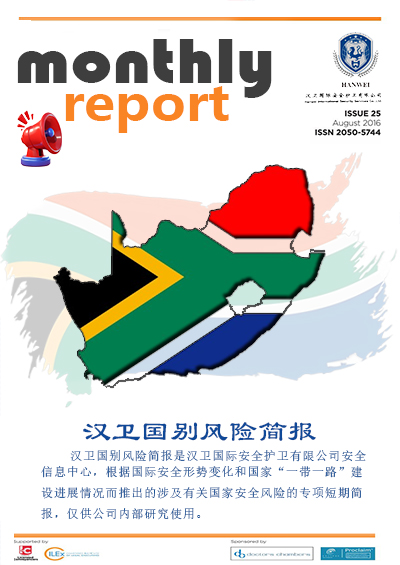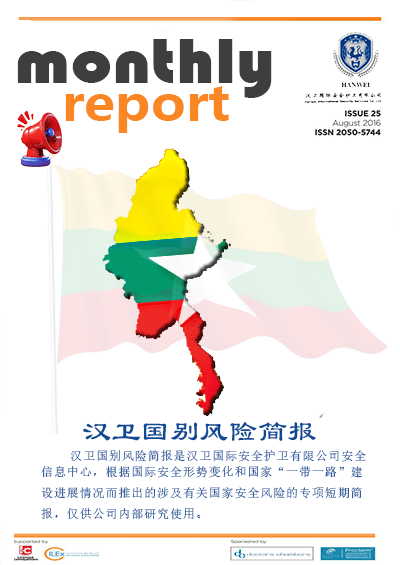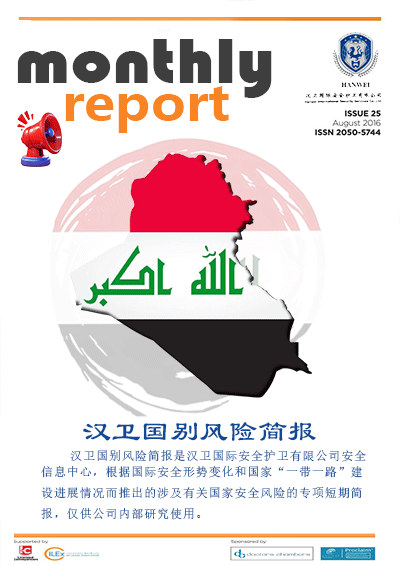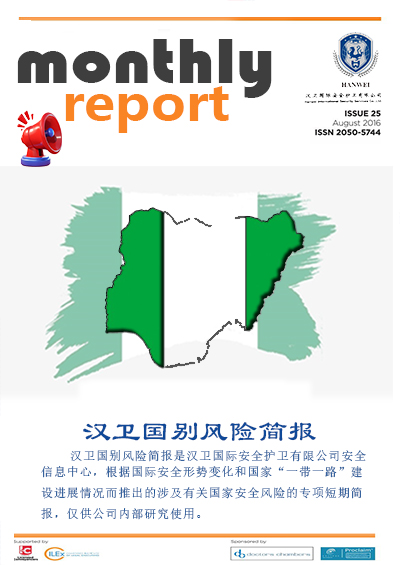Analysis of the Social Security Situation in Nigeria in June 2025
Researcher No. 007
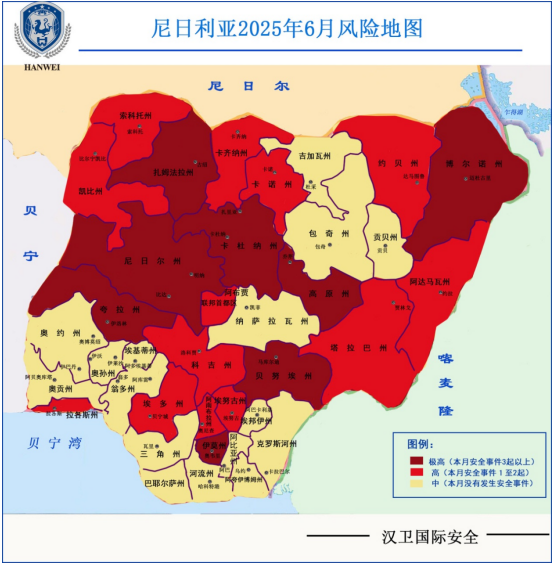
According to the monitoring report of the Security Officer of Hanwei International stationed in West Africa and comprehensive media reports, a total of 67 security incidents occurred in Nigeria in June 2025. A total of 524 civilians and 84 military and police personnel were killed in various security incidents, and at least 52 people were kidnapped. The main types of security incidents include armed attacks and kidnappings, military clearance operations, and public security accidents, etc. Compared with last month, the number of security incidents decreased by 1, the death toll increased by 48, and the number of kidnappings decreased by 37. Analysis suggests that the security situation in Nigeria has further deteriorated this month. Large-scale armed attacks and kidnappings in the central Benue State and Plateau State have continued to increase, with the number of incidents reaching a new high for a single month. In particular, the attack in Benue on June 14th, which claimed over 200 lives, triggered large-scale protests in the local area. In response to this, Nigerian President Bora Tinubu has asked the Nigerian Special Security Forces to arrive in Benue State on the 15th to combat terrorists and restore peace and order. On June 18th, Tinub personally went to Benue State to deal with the recent attacks that occurred in the state. In addition, two more incidents of Chinese citizens being kidnapped occurred this month, seriously threatening the safety of Chinese-funded enterprises and individuals in Nigeria. This month, the security risks in central, north-central and northeastern Nigeria are extremely high, while those in other regions are at a medium to high level.
I. Comprehensive Analysis of Security Incidents
Among the 67 security incidents that occurred in Nigeria in June, 38 were armed attacks, accounting for 56% of the total. There were 13 cases of armed kidnapping, accounting for 19%. There were four demonstrations and protests, accounting for 6%. There were 4 public safety incidents, accounting for 6%. There were 3 armed conflicts among nomads, accounting for 4%. There were five military clearance operations, accounting for 8%. A total of 693 people were killed and at least 52 were kidnapped in various incidents. Among the deceased, there were 524 civilians, 84 military and police personnel, and 85 terrorists were killed. The overall security situation presents the following characteristics:
(1) The security risks in the central and north-central regions are extremely high.
In June, security incidents in Nigeria were mainly concentrated in Benue State and Plateau State in the central part and Zamfarah State in the central-northern part. Meanwhile, Kaduna State in the central and western regions, Niger State, and Borno State in the northeastern region are also high-risk areas. Among them, the central Benue state has the highest security risk, with a total of 13 security incidents, resulting in 302 deaths. The number of incidents has increased by 3 compared to last month, and the death toll has soared by 248, both reaching new highs this year.
Nine security incidents occurred in Plateau State, also located in the central region, an increase of three from last month. The main incidents were armed attacks and kidnappings, resulting in a total of 56 deaths. Especially on June 9th and 10th, three large-scale armed attacks occurred successively, resulting in 24 deaths. Local officials said the reason for the attack was the competition for the mining rights of tin resources. For a long time, the Fulani nomadic herders who believe in Islam and the local farmers who mainly believe in Christianity have been in constant conflict over land and resources. The deep-rooted ethnic and religious contradictions have led to continuous violent incidents. Eight security incidents occurred in Zamfamon State, located in the central-northern part, mainly armed attacks and kidnappings, resulting in 59 deaths and 14 kidnappings. Four security incidents occurred in Borno State in the northeastern part, mainly armed attacks, resulting in a total of 37 deaths.
According to a report by the security officer of Hanwei International stationed in West Africa in mid-June, there is a risk of unidentified armed men attacking and robbing Chinese-funded mining enterprises in Ogun State, located in the southwest of Nigeria. Special reminder: Chinese-funded enterprises and individuals in Nigeria, especially in Ogun State and its surrounding areas, should minimize going out, avoid traveling at night or alone, and refrain from going to remote or sparsely populated places. Keep a close eye on the safety dynamics around the campsites and residences. In addition, protests and marches have been on the rise in Lagos State and the capital Abuja this month. It is reminded that Chinese-funded enterprises and citizens in Nigeria should avoid passing through demonstration routes and crowded places to ensure safety.
Figure 1: Distribution Diagram of Security Incidents in June
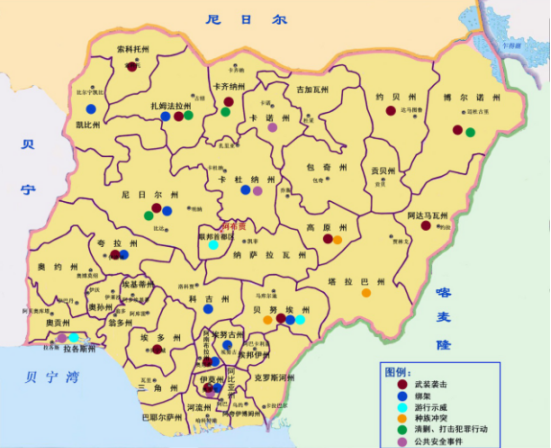
Chart 1: Statistics of Security Incidents in Major Regions in June
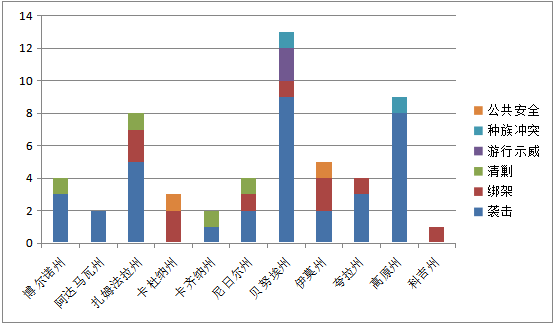
(2) Armed attacks and kidnappings continue to occur frequently.
In June, a total of 51 armed attacks and kidnappings occurred in Nigeria, resulting in 469 deaths and at least 52 kidnappings.The number of incidents decreased by 1 compared to last month, the death toll increased by 118, and the number of kidnappings decreased by 37. This month, the armed attacks were characterized by a high frequency of large-scale attacks. There were as many as 16 attacks that caused more than 10 casualties at a time, with the largest one resulting in 200 deaths. Among them, late at night on June 1st, suspected Fulani armed herders attacked three communities in the Naka area within the jurisdiction of the Gwer West local government in Benue State, causing at least 43 deaths. On June 10th, three attacks in Gowon Prefecture caused at least 20 deaths. On June 12th, suspected Fulani armed herders attacked two communities in Makurdi, the capital of Benoue State, resulting in at least 25 deaths. From the evening of June 13th to 14th, a large-scale attack on the displaced camps in the Guma Local Government District of Benue State was carried out by armed herders, resulting in 200 deaths. On June 19th, an attack occurred in the Bokos and Mangu local government areas of the Plateau region, resulting in at least 15 deaths. On June 20th, Kazina State was attacked by bandits, resulting in at least 24 deaths. On the same day, a suicide bombing attack occurred in Borno State, killing at least 24 people, including the attacker, and injuring many others. On June 24th, terrorists raided a military base located in the local government area of Mariga, Niger State, resulting in the deaths of 17 soldiers. On June 25th, armed bandits ambushed the Shinkafi local government area in Zamfarah State, resulting in the deaths of at least 48 security personnel.
Due to the continuous armed conflicts, the World Bank released a report on June 27th, listing Nigeria among the 39 countries where poverty and hunger have worsened due to conflicts and instability. The report assesses the impact of conflicts and vulnerabilities on the economy in the post-COVID-19 era, showing that 21 out of 39 countries are experiencing armed conflicts. Among them, the extreme poverty rates in countries such as Afghanistan, Burkina Faso, Cameroon, Ethiopia, Libya, Mali, Nigeria, Sudan, Ukraine and Zimbabwe are accelerating, seriously damaging economic development, exacerbating the problem of hunger and hindering the achievement of key development goals.
(3) Incidents related to China occur frequently. In June, five incidents involving China occurred in Nigeria, including two cases of Chinese people being kidnapped, two cases of criminal offenses committed by Chinese people, and one accident.
(1)On the evening of June 4 at approximately 6:30 PM, an armed attack targeted a Chinese-owned mining site in Oreke–Oke-Igbo, Ifelodun Local Government Area, Kwara State, Nigeria. The assault resulted in the deaths of two police officers and the abduction of one Chinese national and one Nigerian worker.Following the incident, the kidnappers contacted an associate named Leo Liang using the victims' phones, demanding a ransom of 1 billion Naira (approximately $1.2 million USD).Currently, the Kwara State Police Command and the Chinese Embassy in Nigeria are coordinating efforts to locate and rescue the abducted individuals.
(2)On June 5th, judges from the Lagos Branch of the Federal High Court of Nigeria convicted nine Chinese citizens of economic sabotage and financial terrorism, sentencing each to one year in prison and a fine of 1 million naira (approximately 1,100 US dollars). The court also ordered the confiscation of all the defendant's items, including furniture, computer equipment and laptops, and their ownership by the federal government.
(3)The Nigerian Ministry of Defence confirmed that the Army's "Operation Harding Kai" forces arrested several terrorist logistics suppliers during a clearance operation in Borno State from June 5th to 7th, including a Chinese citizen who claimed to be a miner. The involved vehicle, motorcycle, mobile phone, Chinese passport and 10,000 naira in cash were seized on the spot. The military has accused these suspects of assisting the extremist groups "Islamic State West Africa Province" and "Hadith Defenders" in their rebellion in the northeast. At present, all the arrested individuals are under interrogation. Details of the case involving Chinese citizens will be made public after the investigation
(4) At about 1:22 p.m. on June 21st, a kidnapping case occurred in the Yagba East Local Government District of Kogi State, Nigeria, resulting in the kidnapping of a Chinese citizen and the death of a local police officer. On that day, a team composed of police and civil defense personnel was attacked by armed kidnappers while escorting a Chinese employee of a Chinese enterprise, resulting in the kidnapping of the Chinese employee.
(5) An explosion occurred at a scrap recycling station of a Chinese-funded steel plant in Kano State, resulting in 5 deaths and 10 injuries. None of the casualties were Chinese citizens. Preliminary investigations suggest that the cause of the explosion might be that villagers mistakenly sold abandoned mortar shells as scrap iron to the recycling station, which triggered the explosion during the unloading process.
(4) Major casualties are caused by public security incidents.
In June, four major public safety incidents occurred in Nigeria, resulting in a total of 48 deaths. Among them, a car accident occurred in Kano State on June 1st, resulting in 22 deaths. On June 3rd, a sandpit collapse occurred in Kaduna State, northern Nigeria, resulting in the deaths of 11 children. On June 24th, an explosion occurred at the Ubehze market in Awoydemili, Ollu Local Government District, Imo Region, resulting in at least five deaths and multiple injuries.
This month, the Lassa fever epidemic remains highly prevalent in Nigeria. The latest report from the Nigerian Centre for Disease Control shows that as of June 15, 2025, a total of 96 local governments in 18 states of Nigeria have reported 5,678 suspected cases of Lassa fever, 766 confirmed cases and 145 deaths, with a case fatality rate (CFR) of 18.9%, higher than the 17.6% level in the same period of 2024. Compared with last month, the number of suspected cases increased by 715, confirmed cases by 46, and deaths by 5. At present, 91% of the confirmed cases are from the states of Ondo, Bauchi, Edo, Talaba and Ebangi.
In addition, Nigeria is still in a period of high flood incidence this month. On June 3rd, the National Emergency Management Agency dispatched officials to 15 high-risk states to further inform residents of the upcoming floods and the necessity of evacuating from flood-prone areas. The states with a high incidence of floods include Kogi, Imo, Enugu, Adamawa, Talaba, Borno, Zamfarah, Kazina and the Federal Capital District.
(V) Continuously carry out military campaigns to clear and crack down on illegal and criminal activities.
In June, Nigerian security forces and police continued to carry out military clearance operations in the central-northern and northeastern regions, and cracked down on illegal and criminal activities in the central and other areas. On June 2nd, the Nigerian Air Force (NAF) carried out an air strike against armed militants in Zamfarah State, killing over 20 armed terrorists and destroying 21 motorcycles. On June 7th, the Nigerian military launched a joint crackdown operation near the town of Kuchi in the Munya Regional Government District of Niger State, killing at least 45 armed men. Intelligence indicates that this group of bandits are the remnants of the terrorist leader Dogo Gild and are planning a large-scale attack on the communities around Kutchi. On June 9th, the Nigerian Air Force continued to carry out the "Operation Hardingkai" (PPHK), launching air strikes against terrorist organization strongholds in Borno State, south of Lake Chad. They destroyed multiple terrorist organization supply stations, armed vehicles and weapons depots, and killed several armed militants.
At present, "Operation Hardingkai" has become the main military mechanism for Nigeria to combat terrorist organizations such as Boko Haram and the Islamic State West Africa Province. Since its launch in 2021, the Nigerian Air Force has carried out over 20 air strikes in the Lake Chad area in the first half of 2025 alone, killing a large number of militants.
Chart 2: Comparison of Security Incident Classifications in June
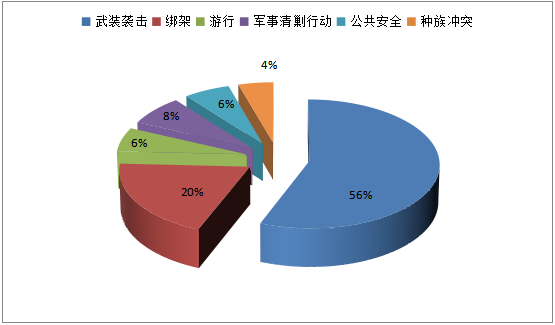
Chart 3: Classification Statistics of Deaths in June
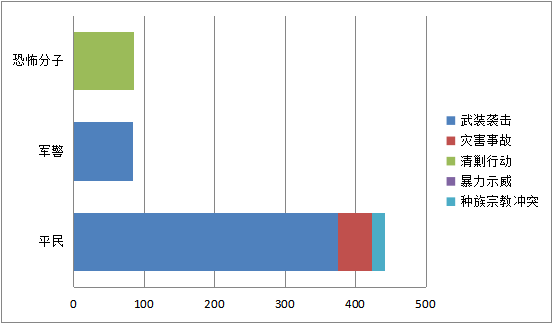
Chart 4 Comparison of the Number of major security Incidents in June and May
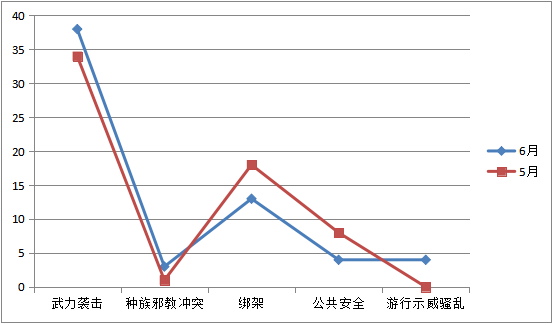
Ii. Risk Early Warning and Prevention Suggestions
Chart 5 Recent Warnings of Social Security Risks in Nigeria
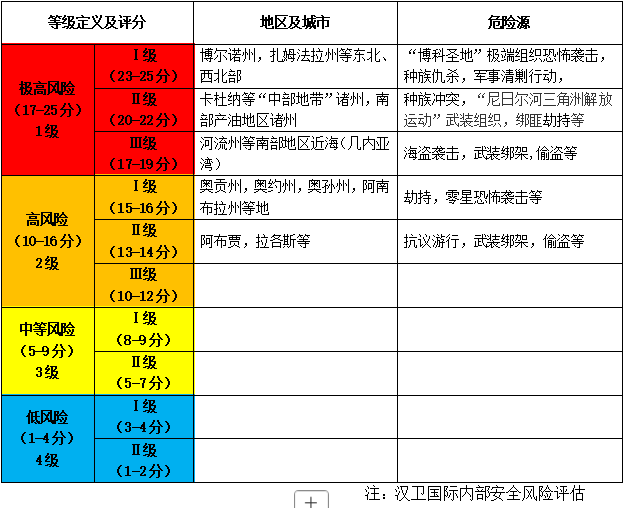
Given the complex social environment and high-risk security assessment in Nigeria, the following security measures are recommended:
The first is to provide full-time security services during travel.In remote rural areas of Nigeria, the police force is limited and the road infrastructure is poor. As a result, the response of security forces to violent crimes and riots and conflicts is often seriously delayed. Therefore, Chinese-funded enterprises and others should promptly obtain the latest local security intelligence, conduct specific security assessments of the travel destinations, and have security personnel accompany and protect them.
Second, be highly vigilant about the risk of kidnapping.This month, two incidents of Chinese citizens being kidnapped occurred, once again sounding the alarm for Chinese-funded enterprises and citizens in Nepal. Remind Chinese-funded enterprises and citizens in Nepal to attach great importance to the risk of kidnapping, take good safety precautions and ensure safety.
Third, pay attention to flood prevention during the rainy season. This month, Nigeria is still in a period of high flood incidence. The National Emergency Management Agency has dispatched officials to 15 high-risk states including Koji State, Imo State, Enugu State, Adamawa State, Talaba State, Borno State, Zamfarah State, Kazina State and the Federal Capital Special Administrative Region to further inform residents of the upcoming floods and the necessity of evacuating from floot-prone areas. For this reason, it is reminded that Chinese enterprises and personnel stationed in Nepal must be highly vigilant and enhance safety precautions. (1) Keep an eye on the disaster situation. Check the early warning information released by the local government and meteorological department in a timely manner to avoid going to high-risk areas for floods. (2) Be well-prepared for emergencies. Check the drainage, power supply and material reserves at the base, formulate an evacuation plan in advance and ensure the smooth operation of communication equipment. (3) Travel with caution. Avoid wading through water and stay away from rivers and low-lying areas. Check the road conditions before setting out to prevent secondary disasters. (4) Mutual assistance and linkage. Strengthen personnel management, improve the emergency liaison mechanism, and contact the embassy or local rescue department immediately in case of emergency.
Fourth, effectively avoid risks.Most of the attacks in Nigeria occurred in the northeastern and central-northern parts, especially in Maiduguri in the central part of Borno State, the roads connecting other major towns, the areas bordering Niger, and Zamfarah State. Recently, security incidents have occurred frequently in Kaduna State and Abuja. In the event of a terrorist attack, one should follow the official instructions and get in touch with their specific security service provider to receive timely assistance. Video surveillance is installed at the base, shops, warehouses and residences, and facilities such as trenches, high walls, barbed wire, anti-collision barriers, buffer zones and alarm systems are set up in the camps to strengthen military and police security forces and expand the defense range. At the same time, it is necessary to avoid lingering near areas that may become targets of armed attacks, including government and security force facilities, landmark buildings and religious sites, etc. In Nigeria, it is particularly important to minimize stays in densely populated public places such as the northeastern region, religious festival sites, areas where ethnic groups live together, regions with a high incidence of crime (especially highways and areas where piracy is active in the Gulf of Guinea), oil and gas facilities, government and military camp facilities, diplomatic embassies, religious worship places, schools, markets, refugee camps, bus hubs, and surrounding areas Time.

